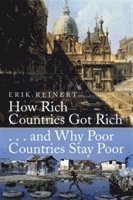
Fler böcker inom
- Format
- Häftad (Paperback / softback)
- Språk
- Engelska
- Antal sidor
- 400
- Utgivningsdatum
- 2008-07-24
- Förlag
- Little, Brown Book Group
- Dimensioner
- 226 x 155 x 34 mm
- Vikt
- ISBN
- 9781845298746
- 530 g
How Rich Countries Got Rich and Why Poor Countries Stay Poor
Häftad,
Engelska, 2008-07-24
216
- Skickas från oss inom 5-8 vardagar.
- Fri frakt över 249 kr för privatkunder i Sverige.
Finns även som
Passar bra ihop
De som köpt den här boken har ofta också köpt Atomic Habits av James Clear (trade paperback (uk)).
Köp båda 2 för 409 krKundrecensioner
Har du läst boken?
Sätt ditt betyg »
Fler böcker av Erik S Reinert
-
Techno-Economic Paradigms
Wolfgang Drechsler, Rainer Kattel, Erik S Reinert
-
Handbook of Alternative Theories of Economic Development
Erik S Reinert, Jayati Ghosh, Rainer Kattel
-
Ragnar Nurkse (1907-2007)
Rainer Kattel, Jan A Kregel, Erik S Reinert
Övrig information
Erik S. Reinert, author of Globalization, Economic Development and Inequality: An Alternative Perspective (2004), is Professor of Technology, Governance and Development Strategies at Tallinn University of Technology, Estonia, and President of The Other Canon Foundation, Norway. He is one of the world's leading heterodox development economists and is based in Norway.
Du kanske gillar
-
Peak Human
Johan Norberg
Inbunden -
Peak Human
Johan Norberg
Häftad -
Leaders Eat Last
Simon Sinek
Häftad -
Empire of AI
Karen Hao
Inbunden -
7 Habits Of Highly Effective People: Revised and Updated
Stephen R Covey, Sean Covey
Paperback - Trade paperback (UK)


